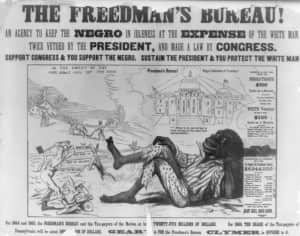Post-war contract law in the nineteenth century
By Kristopher A. Nelson
in
March 2012
500 words / 3 min.
Tweet
Share
In many respects, the so-called “black codes” put in place in the South immediately after the Civil War exemplify the potential extremes of nineteenth-century contract law. Although these laws only lasted for a few years before the Republican Congress – dominated by Northerners after the secession of the South – stepped in and forced the South to accept new […]

Please note that this post is from 2012. Evaluate with care and in light of later events.
 In many respects, the so-called “black codes” put in place in the South immediately after the Civil War exemplify the potential extremes of nineteenth-century contract law. Although these laws only lasted for a few years before the Republican Congress — dominated by Northerners after the secession of the South — stepped in and forced the South to accept new laws and to repeal the black codes. Additionally, the Civil Rights Act of 1866, along with the Fourteenth and Fifteenth Amendments, effectively overrode the black codes and their discriminatory practices (see, for example, In re Turner), although some aspects would reappear later in the century, as part of “Jim Crow” and segregation.
In many respects, the so-called “black codes” put in place in the South immediately after the Civil War exemplify the potential extremes of nineteenth-century contract law. Although these laws only lasted for a few years before the Republican Congress — dominated by Northerners after the secession of the South — stepped in and forced the South to accept new laws and to repeal the black codes. Additionally, the Civil Rights Act of 1866, along with the Fourteenth and Fifteenth Amendments, effectively overrode the black codes and their discriminatory practices (see, for example, In re Turner), although some aspects would reappear later in the century, as part of “Jim Crow” and segregation.
The black codes often required “persons of color” to sign year-long labor contracts, with wages payable at the end of the year, and punished “vagrants” found in public with mandatory labor. Newly freed slaves were often prohibited from working in many occupations and from acquiring land. But even when not forced by law or force to sign such contracts, many African-Americans — with limited options — signed such contracts voluntarily.
Despite their unfair terms and limited voluntariness, Southern courts enforced these contracts. (It was, in truth, extremely difficult for African-Americans to challenge their terms, since the codes also limited access to the courts by former slaves.)
The Freedmen’s Bureau, established by Congress in 1865 as part of the Department of War, tried to mitigate the black codes. It attempted to “provide food, shelter, education, and legal protection to the recently emancipated slaves” (Hall 266), and even heard cases where the state judicial system was inadequate or lacked due process (266). According to Paul Cymbala, the Bureau also supervised contracts — although that might well have reinforced the power of “contract slavery” by encouraging freedmen to voluntarily sign such contracts.
Regardless of the racial basis of such contracts, the law continued to pretend, at least into the twentieth century, that labor contracts were the result of free bargaining between equal parties. In Allegeyer v. Louisiana, 165 U.S. 578 (1897), the Supreme Court explained that the Fourteenth Amendment guaranteed “liberty of contract” :
the term is deemed to embrace the right of the citizen to be free in the enjoyment of all his faculties; to be free to use them in all lawful ways; to live and work where he will; to earn his livelihood or avocation, and for that purpose to enter into all contracts which may be proper, necessary and essential to his carrying out to a successful conclusion the purposes above mentioned.
Thus, the Fourteenth Amendment had shifted from a device to free enslaved labor, to one that consigned laborers to effective enslavement and terrible working conditions — provided there was a contract to that effect.